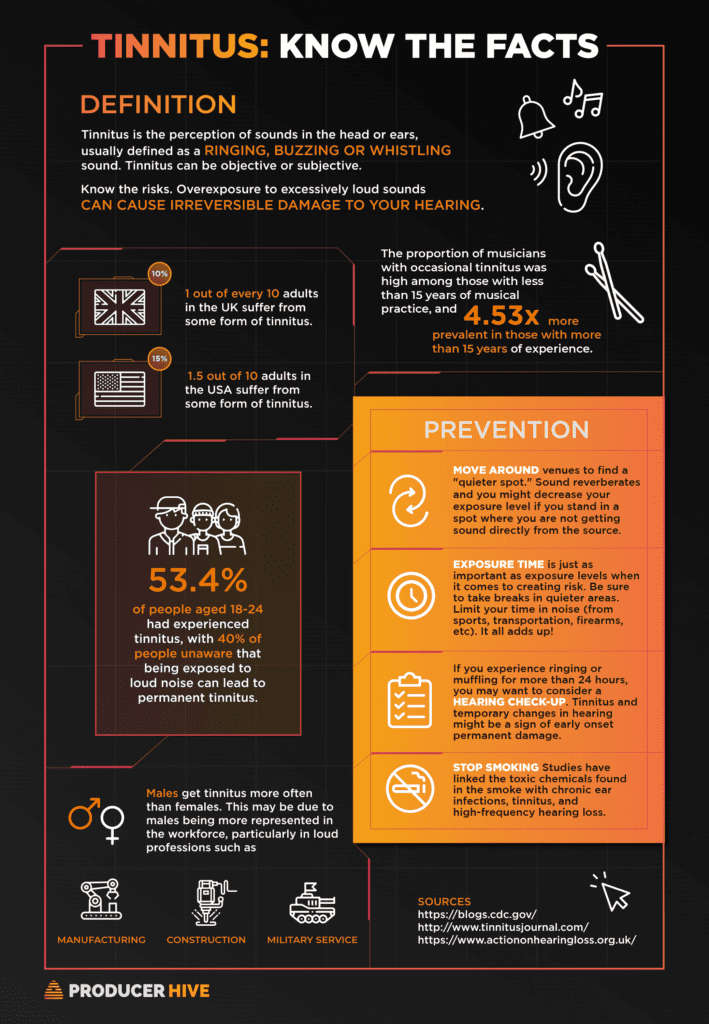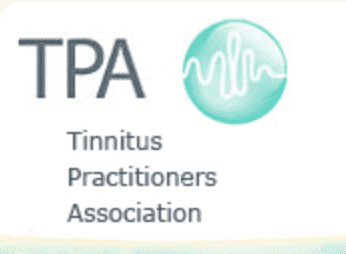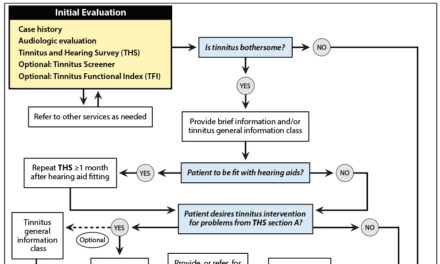By Steven R. Taddei, AuD
What Is Tinnitus?
Worthy of an Edgar Allen Poe poem, tinnitus can be melodic, persistent, illusive, and disturbing. It can take many forms such as ringing, buzzing, hissing, or even music.
For some people, it is spontaneous and temporary while others hear it constantly. Tinnitus can even manifest as two distinct and dissonant tones between the ears.
If you have never experienced tinnitus, recall the hissing noise from an old tube television. If that does not ring a bell, you can listen here to simulations made through the British Tinnitus Association.
Tinnitus is the involuntary perception of sound originating from the head3
In other words, it is a noise people hear that does not exist in the surrounding soundscape. There is much uncertainty and confusion regarding this phantom sensation.
Perhaps not surprisingly, even the pronunciation of its name strikes much controversy (both ti-NIGHT-us and TINN-a-tus are appropriate).
Estimates from the US Centers for Disease Control (CDC) suggest that over 50 million Americans experience tinnitus in some form. This is cause for concern as tinnitus can have a serious effect on people’s well-being.
It can cause anxiety, stress, poor concentration, and sleep disturbances. 4-5, 9
Fortunately, tinnitus is not always a cause for concern.
For example, most of the population will perceive some phantom noises if left in an anechoic environment, ie, a room with minimal to no sound reflections.
While tinnitus can be a trivial perception, there are certain indications that may be cause for concern and further evaluation with a general practitioner, otologist, and or an audiologist. Some red flags include:
- Pulsatile tinnitus (rhythmic tinnitus at the rate of your heart beat),
- Prolonged unilateral tinnitus (occurring in only one ear),
- Sudden onset of tinnitus,
- Worsening of tinnitu.s
It is no wonder, given its complexity and variability, that tinnitus can draw so much attention.

Is There Really No Cure For Tinnitus?
It is important to note that tinnitus is a symptom and not a diagnosis.
This means that tinnitus is the result of something else going on in our bodies and, therefore, our ability to cure someone’s tinnitus depends on the root cause.
People experiencing tinnitus as a result of:
- Ear infections,
- Temporal mandibular joint (TMJ) disorders,
- Stress,
- Sinus congestion,
- Occluding earwax,
- Poor nutrition.
Many will likely see, or better yet hear, relief once the cause is treated.
Some medications also have noted side effects of tinnitus, eg, non-steroid anti-inflammatory drugs (NSAIDs), cancer treatments, water pills (diuretics), and some antibiotics. Discontinuing the use of such medications can ease symptoms of tinnitus or remove them entirely.
If you believe your tinnitus is associated with your medication, speak with your prescribing practitioner for advice—do not stop taking medications without consulting a professional.
Clearly, there are some mechanisms behind tinnitus that are curable.
This begs the question, does your tinnitus fall under one of these curable categories?
The first step in answering that question requires you to visit your general practitioner. Further evaluation with a specialist may be necessary to diagnose the underlying causes and rule out anything sinister.
What Can You Do If You Experience Tinnitus?
For many people, tinnitus cannot be improved with medical intervention.
This does not mean there is no hope.
On the contrary, there are many treatment options supported by scientific studies. Here are some tinnitus management options.
Information
Educating yourself is a fantastic start to managing your tinnitus. Not surprisingly, some people can better cope once they understand their tinnitus is not a sign of psychological issues or a life-threatening ailment.
Reducing Stress
This is a good recommendation for everyone. If you need yet another reason to relax, people with high levels of stress share a similar probability of developing tinnitus as those exposed to occupational noise.1
Hearing Aids
Eighty to ninety percent of individuals with tinnitus also have some degree of hearing loss.7 Therefore, pursuing amplification alone can significantly improve your quality of life. Professionally fit hearing aids have also been shown to provide some individuals with tinnitus relief through reduced stress/auditory fatigue and masking.2, 6
Tinnitus Maskers
Many people hear their tinnitus worsen at night or while in quiet environments. This is because external environmental sounds can help cover up and distract you from tinnitus. Consider using a fan, television, white-noise generator, or music. Apps such as GN ReSound Relief (read more here) are free, provide multiple maskers, and offer both information and stress-reduction techniques.
Hearing Protection
Some people can experience a worsening of tinnitus following exposure to loud and or sudden noises. Hearing protection is an easy solution to mitigate such issues and can help protect you from sustaining further hearing damage.
When looking for different methods to manage your tinnitus, it is important to do your homework and keep up to date. There are many products on the market without a proven track record.
Further, here are other treatment options that are not recommended based on tinnitus guidelines published by the American Academy of Otolaryngology:8
- Antidepressants, anticonvulsants, anxiolytics, and intratympanic medications,
- Ginkgo biloba, melatonin, zinc, or other dietary supplements,
- Acupuncture,
- Transcranial magnetic stimulation (TMS).
Prevention and mitigation are the best method for dealing with tinnitus, both after it arises and as a proactive measure. Consider investing in a quality pair of earplugs if you work in or are adjacent to the music industry, as doing so can help preserve your most precious instrument—your ears.
Cognitive Behavioral Therapy (CBT)
CBT involves education, stress reduction, and other forms of behavioral intervention. The goal is to teach you techniques to identify and challenge your negative thoughts regarding tinnitus. In doing so, your tinnitus can become less bothersome as you change your pattern of behavior and reactive tendencies towards the perceived sound.
How Can You Prevent Tinnitus?
Any discussion of tinnitus would be incomplete without addressing the effects of hazardous sound exposure on our hearing mechanism. Hearing loss can result from:
- Head trauma,
- Genetics,
- Ototoxic medications,
- Infection,
- Cardiovascular issues,
- Loud sounds.
Of those six, arguably only one is preventable—hearing loss from sound exposure.
It is concerning as both music and noise-induced hearing loss are extremely prevalent. Exposure to loud sounds will eventually cause sensorineural, or cell-based, hearing loss, which is irreversible.
As mentioned above, hearing loss is generally associated with tinnitus. Here are a few tips to help prevent unnecessary damage to your hearing system:
- Reduce the level of loud sounds (eg, hearing protection) and the duration of your exposure.
- Download free apps such as the NIOSH Sound Level Meter (SLM) which allow you to monitor sound levels in your environment (read more here).
- Purchase earplugs and a keychain carrying case, and attach them to your keys. That way you always have hearing protection at arm’s length.
Final Thoughts
There are many considerations regarding tinnitus and overall hearing health. If you have any questions never hesitate to reach out to an audiologist in your area.
Considering the negative effects of tinnitus, it takes little energy to ask questions, be informed, and protect your ears. You are already part of the statistics, so choose to be on the right side.
This article originally appeared on the Producer Hive website.

Steven R. Taddei, AuD, is a licensed music audiologist, audio engineer, professor of sound, and entrepreneur. He has been recording and producing music for over ten years in the Chicagoland area. Further, he hosts and produces the Hearing Now Podcast. When he’s not in the clinic, studio, or classroom you can find him playing guitar and woodworking.
References
- Baigi A, Oden A, Almlid-Larsen V, Barrenas ML, Holgers K-M. Tinnitus in the general population with a focus on noise and stress: A public health study. Ear Hear. 2011;32(6):787–789.
- Kochkin S, Tyler R, Born J. MarkeTrak VIII: The prevalence of tinnitus in the United States and the self-reported efficacy of various treatments. Hearing Rev. 2011;18(12):10-27
- National Research Council. Tinnitus: Facts, theories, and treatments. https://www.nap.edu/catalog/81/tinnitus-facts-theories-and-treatments; 1982.
- McKenna L. Tinnitus and insomnia. In: Tyler RS, ed. Tinnitus Handbook. 1st ed. Cengage Learning; 2000.
- McKenna L, Daniel HC. Tinnitus related insomnia treatment. In: Tyler RS, ed. Tinnitus Treatment: Clinical Protocols. Thieme Medical Publishers; 2005.
- Searchfield GD, Kaur M, Martin WH. Hearing aids as an adjunct to counseling: Tinnitus patients who choose amplification do better than those that don’t. Int J Audiology. 2010;49(8):574-579.
- Sweetow RW. An integrated approach to tinnitus management. AudiologyOnline. https://www.audiologyonline.com/articles/integrated-approach-to-tinnitus-management-11598. Published February 4, 2013.
- Tunkel DE, Bauer CA, Sun GH, et al. Clinical practice guideline:Tinnitus. Otolaryngology–Head and Neck Surgery. 2014;151(2):S1-S40.
- Tyler RS, Baker LJ. Difficulties experienced by tinnitus sufferers. J Speech Hear Disord.1983;48(2):150-154.





